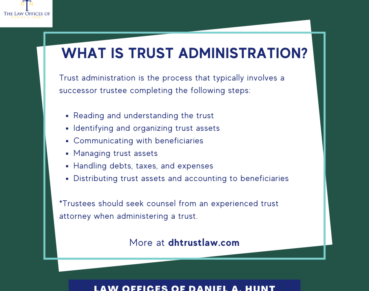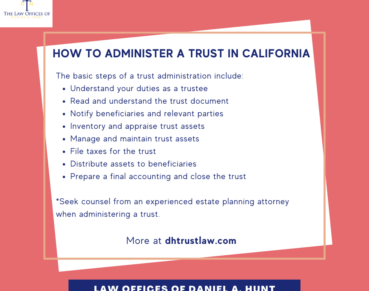Understanding Your Duties as a Trustee

As a new trustee, one of your first questions might be: What exactly are my duties in this role? Understanding your duties as a trustee serves two critical purposes:
- It helps you carry out the wishes of the loved one who trusted you to act in their best interests.
- It helps you avoid litigation, especially with the trust beneficiaries.
Over the centuries, rules have developed which impose duties on persons acting as trustees of a trust. In 1986, the California legislature enacted statutes in the Probate Code that codify many of those duties. Let’s take a look at some of the most relevant duties you have as a trustee.
Probate Code Section 16000: Duty to Administer Trust
This statute requires a trustee to administer a trust according to law and in accordance with the trust agreement. No matter how good the trustee’s intentions, the trustee is not free to administer the trust in some other manner.
Here’s an example: Let’s say the Settlor left their estate equally to their children outright (meaning with no additional stipulations), but one of the adult children is a drug addict. You might think it would be better to oversee that beneficiaries’ inheritance on their behalf to prevent them from causing harm to themselves or others.
You may be completely right; maybe the Settlor should have requested that the terms of the trust be written differently. However, as this section of the Probate Code explains, you must administer the terms of the trust as written and not as you may believe it should have been done.
Probate Code Section 16002: Duty of Loyalty
Under this statute, a trustee has a duty to administer the trust solely in the interest of the beneficiaries. The trustee cannot use the trust for their own benefit. We once dealt with a trustee who chose to invest trust funds into their own personal business… which later failed, losing the trust funds. Always keep the beneficiaries’ interests as your top priority.
Probate Code Section 16003: Duty to Deal Impartially with Beneficiaries
This statute states: “If a trust has two or more beneficiaries, the trustee has a duty to deal impartially with them.” A trustee cannot favor one beneficiary over another. This is particularly critical when the trustee is also one of the beneficiaries. In such cases, it is a clear violation of the law for the trustee to favor themself over another beneficiary.
Observing this duty can be challenging when family dynamics are strained. If you’re the successor trustee and you struggle to get along with another family member/beneficiary, be especially careful. You cannot choose to give one beneficiary more of the inheritance than another one (although you can take a trustee fee for your efforts). You cannot favor one sibling with more communication regarding the trust administration while keeping another sibling in the dark. All dealings must be equal.
Probate Code Section 16004: Duty to Avoid Conflict of Interest
This statute requires that trustees avoid conflicts of interest. This prohibits a trustee from entering into transactions with trust property that will result in a profit to the trustee, or in which the trustee’s interest is adverse to the interests of the trust or its beneficiaries.
For example, a trustee usually must avoid taking personal loans from the trust, because it would result in the trustee having a conflict between their duties to the trust and their personal interests in profit. Also avoid purchasing or receiving in-kind distributions of real property from the trust. The beneficiaries might view it as self-dealing and placing your interests above theirs.
Probate Code Section 16006: Duty to Take Control of and Preserve Trust Property
This statute requires trustees to take affirmative action to take and keep control of trust assets and to preserve that property. If the trust includes real estate and someone else is living in the property when the Settlor dies, the trustee may have a responsibility to remove that tenant and prepare the property to be sold in a reasonable time frame for a fair market value.
Probate Code Section 16007: Duty to Make Trust Property Productive
This statute requires the person managing the trust to make trust assets productive. This generally requires you to ensure that assets of the trust are wisely invested, especially when you are acting as a trustee in an ongoing, long-term situation. Weak-performing investments should be reinvested in more profitable ways. It’s never a good idea to let trust properties sit stagnantly; as trustee, you must act as a wise steward over them.
If you are acting as a successor trustee after the Settlor has passed away, however, your main goal is to efficiently distribute the assets to the beneficiaries. Make sure you don’t delay distributing assets because you want to wait until the real estate or stock market soars.
Probate Code Section 16009: Duty to Keep Trust Property Separate and Identified
This statute requires a trustee to keep trust property separate from property not subject to the trust. A trustee should not keep personal funds and trust funds in the same bank account. This mistake of commingling personal assets and trust funds is one of the most common errors we see trustees make.
We once had a trustee deposit his personal funds into the trust account. Over time, he couldn’t remember which money had been his versus that of the trust. As a result, he had to pay the trust back money that was probably his own in order to account for all of the funds.
Probate Code Section 16060-16061: Trustee’s General Duty to Report Information to Beneficiaries
This statute requires a trustee to keep beneficiaries informed with respect to matters involving the trust. Beneficiaries are entitled to a copy of the trust document. If they request a copy of the trust, you must provide it to them. If you withhold the trust from them, they could sue you – and you would have to pay their attorneys’ fees since you breached your trustee duties.
Probate Code Section 16062: Duty to Account to Beneficiaries
This statute requires a trustee to provide beneficiaries with an accounting and report of their actions and conduct in managing the trust. These “accounts” are detailed reports regarding the financial transactions of the trust. They are similar to bank account statements in which a bank reports a “beginning balance,” an “ending balance,” and all the transactions that occurred during the reporting period that “account” for the difference between the beginning balance and ending balance.
As a trustee, you must report the trust income and income source. You must also report the trust expenses, including to whom they were paid and for what purpose. Finally, the account must include any trust distributions and/or trustee compensation paid during the account period. A trustee must keep careful records in order to be able to comply with this requirement.
Probate Code Section 16080: Discretionary Powers to be Exercised Reasonably
This statute states that, when a trustee is given “discretion” with respect to a matter, the “discretion” must be exercised in a reasonable manner. The trustee is not free to act in whatever way the trustee wants. This is true even if the trust documents state that the trustee’s discretion is “absolute” or “uncontrolled”.
One misstep we see some trustees make is failing to be reasonable when dealing with the decedent’s personal property. Occasionally, they will sell or dispose of the personal property without considering any special items the beneficiaries may desire to keep. Often the personal property is deeply personal to the beneficiaries. We recommend showing a reasonable consideration for the beneficiaries’ wishes when disposing of personal property.
Probate Code Section 16200: General Power of Trustee
A trustee’s power (or legal authority) to take actions pertaining to the trust is not unlimited, and in some cases may be very restricted. For example, a trust instrument may limit the kinds of investments that the trustee can make with trust property. This statute provides that the trustee powers are those conferred by the statute and the trust instrument. Trustees must be careful to avoid taking unauthorized actions.
The best way to avoid breaching this duty is to administer the trust under the supervision of an experienced trust attorney. They can coach you throughout the estate administration to prevent any potential breaches of fiduciary duty.
If you have any questions about your duties as trustee or how to administer a trust, please feel free to contact our office.
Law Offices of Daniel A. Hunt
The Law Offices of Daniel A. Hunt is a California law firm specializing in Estate Planning; Trust Administration & Litigation; Probate; and Conservatorships. We've helped over 10,000 clients find peace of mind. We serve clients throughout the greater Sacramento region and the state of California.




